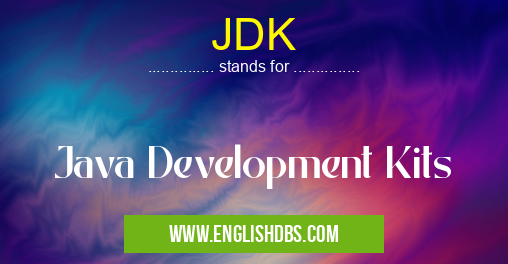What does JDK mean in JAVA
JDK (Java Development Kit): A Comprehensive Overview

JDK meaning in Java in Computing
JDK mostly used in an acronym Java in Category Computing that means Java Development Kits
Shorthand: JDK,
Full Form: Java Development Kits
For more information of "Java Development Kits", see the section below.
JDK, short for Java Development Kit, is a software development environment that provides the necessary tools and resources for developing Java applications. It includes the Java compiler (javac), debugger (jdb), and other essential tools for creating, compiling, and debugging Java programs. JDK is essential for Java developers as it provides a comprehensive set of utilities and libraries that facilitate the development process.
JDK Components
The JDK consists of several key components that work together to support Java development:
- Java Virtual Machine (JVM): The runtime environment for Java applications, responsible for executing Java bytecode.
- Java Compiler (javac): Translates Java source code into Java bytecode, which can be executed by the JVM.
- Java Debugger (jdb): Allows developers to step through code, set breakpoints, and inspect variables during debugging.
- Java Documentation (javadoc): Generates documentation for Java classes, methods, and packages.
- Java Archives (JARs): Files that package Java class files and related resources into a single distributable unit.
Benefits of Using JDK
- Comprehensive Toolset: Provides a complete suite of tools for Java development, eliminating the need for external tools.
- Improved Productivity: Streamlines the development process by automating tasks and providing debugging capabilities.
- Compatibility: Ensures that Java applications run consistently across different platforms, thanks to the JVM's cross-platform nature.
- Robustness: Offers a stable and well-tested environment for developing mission-critical applications.
Essential Questions and Answers on Java Development Kits in "COMPUTING»JAVA"
What is Java Development Kit (JDK)?
JDK is a software development kit that provides the necessary tools to develop, compile, and run Java programs. It includes the Java Virtual Machine (JVM), Java compiler, Java class libraries, and other essential components.
Who uses JDK?
JDK is used by Java developers, programmers, and software engineers to create and run Java applications. It is also used by computer science students and professionals who need to learn or work with Java.
What are the components of JDK?
JDK consists of several key components:
- Java Virtual Machine (JVM): Executes Java bytecode on any platform where the JVM is installed.
- Java Compiler (javac): Converts Java source code into Java bytecode.
- Java Class Libraries: Provide predefined classes and methods for common programming tasks.
- Java Documentation Generator (javadoc): Generates documentation from Java source code.
- Java Debugger (jdb): Helps debug Java applications.
What is the difference between JRE and JDK?
JRE (Java Runtime Environment) contains only the JVM and Java class libraries, which are essential for running Java applications. JDK, on the other hand, includes all the components of JRE, plus the compiler, debugger, and other development tools.
How do I install JDK?
You can download and install JDK from the official Oracle website. The installation process varies depending on the operating system you are using.
How do I use JDK?
To use JDK, you first need to set the JAVA_HOME environment variable to point to the JDK installation directory. Then, you can use the javac command to compile Java source code, the java command to run Java applications, and other commands to access the various JDK tools.
Final Words: JDK is an indispensable tool for Java developers, providing a rich set of features and utilities that streamline the development process. Its comprehensive components, including the JVM, compiler, debugger, and documentation generator, empower developers to create high-quality and robust Java applications. By leveraging the JDK, developers can enhance their productivity, ensure compatibility, and foster a reliable development environment.
